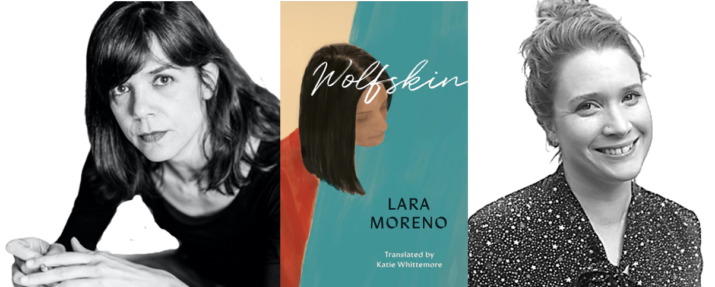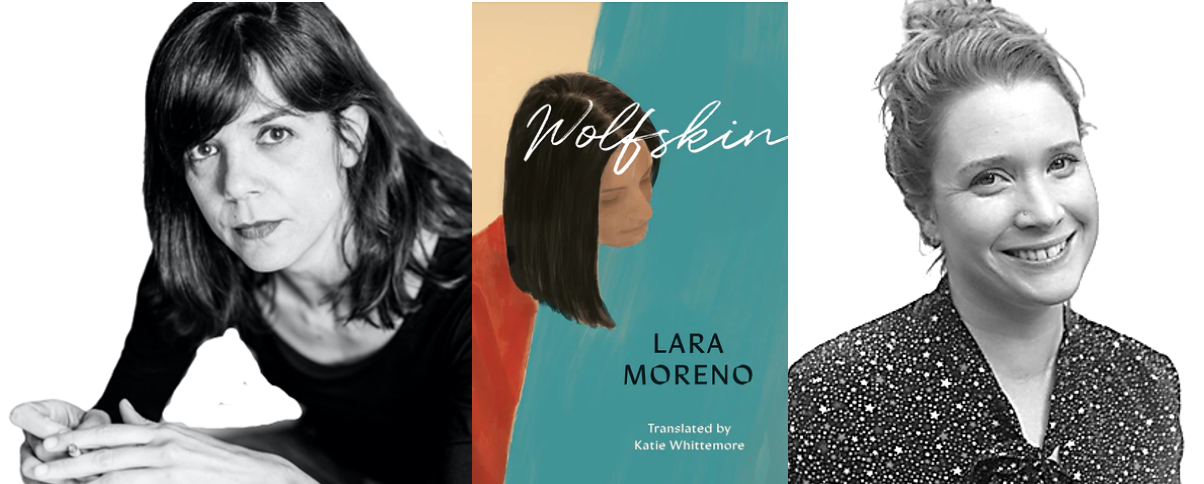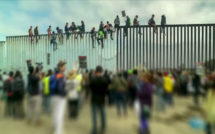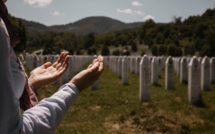

Translated from the Spanish by Katie Whittemore.
There is a small plastic horse in the corner of the modest fenced-in yard. It looks like it’s been there for eternity, yet it’s not actually old. That particular corner is the only part of the yard that has been conserved as a garden, that wasn’t sealed with cement and tile and made into a patio. Grass now grows in dirty clumps around the rocking horse. The grass has never been tended by a gardener, but, at one point, something like a lawn used to sparkle on sunny winter days.
Two sisters walk through the gate. They aren’t unsettled by the sight of the abandoned plastic rocking horse, blue and white. Maybe they’ve shut their eyes, maybe they’ve entered that space blindly. They know the way by heart. Nevertheless, one of them—the youngest—walks over to the corner, resolute, while the other woman unlocks the door. Without thinking, as if she’d planned it, she grabs the horse by one of its handles and lifts. The dirt stirs with ants and woodlice, the only damp spot in the yard. The woman exits back through the gate with the rocking horse on her back and drops it next to the dumpster on the front sidewalk. The plastic creaks, defeated by sun and heat. Unfettered by nostalgia, the woman enters the house and doesn’t look back.
Clothing and keepsakes have begun to pile up on the bed. Old pairs of dark trousers, hems hand-sewn and ironed, the crease on the trouser leg still intact. White shirts, an occasional light blue, winter plaids, fine-knit vests, leather belts, the changing shape of the buckle holes through the passing years. Thin socks, the elastic worn. A couple of jackets, no ties, a stiff raincoat, a thickly lined winter coat, mismatched pyjamas with pitiful patterns from the 1990s, white briefs, some of them with holes. The sorry trousseau of a man on his own. No jewellery. His wedding ring isn’t there, no pair of cufflinks with engraved initials, no little gold chain from his first communion. Sofía and Rita work thoroughly, impatiently. Almost everything they find they put in big plastic bags; sometimes one will stop to smell a piece of clothing, the folded cloth handkerchiefs, a throw pillow squashed down on the rocking chair. It all smells of dust, of damp, of closed rooms, but still, there’s a rem-nant of a memory, the presence of the man, a light whiff of cologne or aftershave.
Their father died a year ago. He was fortunate: it wasn’t cancer, nothing degenerative. A simple, efficient brain aneurysm felled him one June morning, just after break-fast. His overturned teacup had still been on the table. Instead of rolling to the floor, it knocked against the plate of toast and there it had remained: the butter knife on one side, a crumpled paper napkin on the other. The TV on. The windows open. The body on the floor, the leg of a chair pressing on his abdomen. He was like that for two days.
Sofía sifts through the books. Some she’s read or heard of, but others are new to her, likely purchased at flea mar-kets or from big overstock warehouses. They don’t interest her. She puts them in boxes, without bothering to wipe off the dust. Nor does she look for any writing on the first pages, either: a date, a dedication, her father’s signature.
He didn’t love books enough to write in them. She fills two boxes and seals them with packing tape, then places the few volumes she has set aside back on the bookshelf, next to some ugly, abstract porcelain figurines and framed pho-tographs. She lays them facedown; they’ll divide them up later.
It’s beginning to get hot and Sofía is hungry. She goes through the rooms looking for her purse and finds her sister moving the kitchen furniture, coming and going with electric appliances covered in grease, a blender, a juicer, and dishrags, too, bought a decade before and never used. Are you hungry? Rita asks. I am, but I need to make a call first. Sofía finds her bag and goes outside. A green plastic table and two chairs sit next to the door on a little outcrop that can’t quite be called a porch. They’re dirty. The tabletop bears the marks of several glasses: fossils of fruit juice, a two-litre bottle, an inopportune whisky, red wine from the odd family meal. Sofía sits in one of the chairs and stretches out her legs, spreading her feet wide. She’s not sure if she’s tired, bored, or simply ill at ease. Practically nobody is on the street at this time of day, just the occasional car, someone coming home from work for a mid-morning break. The house is in an old development outside of town, on the way to the beach. Not a uniform group of row houses, but a development from the 1970s, made up of libertine, unaesthetic homes. But she likes it. Many of the neighbors have renovated the original struc-tures, added another floor, a pool, raised the fences and covered them with ivy or bamboo cane. There had been other owners, but her father had left the house exactly as it was. He was responsible for that disaster of a yard, how-ever, spreading cement over everything and laying tiles, just so there wouldn’t be anything to maintain: conveni-ence over beauty. She likes the house anyway. It makes her feel uneasy, but she likes it. Deep down she doesn’t want to get rid of it; in the end, it’s the only place she has to go back to. She opens her bag and grabs her phone, dials. She takes a deep breath, she wants to sound calm and confi-dent when he picks up, maybe even a little distracted. No one answers.
Hey, are you done? I’m ready to eat. A minute later, Rita finds Sofía in the same position, seated on the chair on the porch. Sofía turns, the phone still in her hand. She’s called twice more. Nothing. There’s no reason to be afraid, just irritated. No reason to worry. She shifts in the chair, looks at the sky. Rita observes Sofía’s hands lying tense on her lap. Yeah, all set. Let’s eat. Sofía pulls herself up, leaning her weight on the arms of the chair; her movements seem too slow, like something isn’t working right, like she’s aged. That’s how she feels, actually. Old.
She put the bag full of food she prepared the night before in the unplugged refrigerator when they’d arrived at the house, and now she takes it out. She’s starving. Resent-ment gives her an appetite. But Rita has other plans. She’s wearing her canvas sneakers and carrying her handbag, has put on lipstick. She looks at Sofía, surprised. Please don’t tell me you think we’re going to eat here, in the house. There’s nothing here, we’re emptying it out ourselves. Why would you want to eat here? Sofía knows Rita’s right: the normal thing to do is go out. I don’t know, because I don’t feel like wasting money at a restaurant. Because I made rice salad last night and that’s what I feel like eating. Yeah, but you make rice salad every night. Don’t you want to have lunch at one of the places on the beach? Sofía’s face is already darkening, her own particular shade of weariness. I’d rather eat here, but you go. Rita sighs, turns, and drops her bag in one of the rooms, takes off her shoes, wipes off her lipstick. She does want to go out, get some air. But she’ll stay. She’ll eat with her sister in the empty house and she’ll rush to finish packing so she can get out of that place before nightfall. Fine, we’ll eat here, but I’m not eating on the porch because it’s way too hot, and there’s no way I’m sitting at papa’s table or in one of those chairs. Move them and we’ll eat on the floor. I have to pee.
Sofía has always looked a little heavy next to her sister, though she isn’t, really. She’s not big-boned, not a robust woman. She’s tall, a little curvy maybe, but her curves are smooth, premeditated, as if they’ll stay in the same place forever. But since she’s the oldest, she’s bigger. She weighs more, it takes more effort for her to move. She’s always preferred to sit and watch her little sister—light, fibrous, lively, agile—dance around her, run down those sandy paths, almost flying. The wind carrying her off. It’s still like that, now.
They’ve moved the table where their father was eating when he died, and the chairs, too. Sofía has managed to find a decent, unstained tablecloth, because a plain oil-cloth wouldn’t do. She spread it on the floor in the middle of the living room and set two pillows across from each other. Two plates, two glasses, a glass jug filled with tap water, two identical forks. In the center of the tablecloth, her brown rice salad: carrot and brown apple, a little olive oil, salt and sesame seeds. Sofía no longer looks so defeated; this simulacrum of a picnic has cheered her. It wouldn’t have bothered her to eat at the table where their father died because she suspects that he actually died on the floor. In fact, it’s more likely that he died in the exact spot where her sister Rita now sits with her pretty legs crossed. Moreover, no one knows how long he was there, writhing on the verge of death. The doctors said no time at all, not even a second; he collapsed and it was over, but who knows, no one was there. No one came for two days. She’d like to tell Rita what’s just occurred to her, but now isn’t the time. Better to say nothing. Serve the salad. Eat.
And so they do. Sofía chews with the enthusiasm of a militant. Her eyes even shine. She’s forgotten the phone, the unanswered calls, the hot little restaurants on the beach, her father. She chews and swallows with concentra-tion, she likes the taste of olive oil on the brown rice. She knows it’s good for her, good for the world. Rita watches her sister, her straight back, the solidness of her shoulders, her presence. She watches in amazement as she chews—a thousand and one times—those hard, bland grains of rice. Rita would almost say that the rice was raw, that Sofía took it out of the package like that, one handful then another and another, drizzled on the olive oil and there you go, lunch. She tries to swallow quickly, aided by big sips of water. This sisterly performance needs to end as quickly as possible. Her posture betrays her indifference. A somewhat despotic laxity, inherent to the eternal adolescence of her limbs, her delicate back, even her cheekbones and the high, clear reptilian forehead, beautiful, cold. She wants to wrap this all up. Sofía has proposed they rent the house out instead of putting it on the market, but Rita wants to sell, even though she’s not necessarily the one that needs the money. Sofía finishes her meal and looks directly at her little sister, sinks into her big eyes: grey, brown, changeable, set in their dark circles. The look lasts only a few seconds. Just an instant, when neither sister has anywhere else to be, nothing waiting for them in the world outside. It’s as if the years haven’t passed, or better still, as if the two sisters have arrived at the place where everything comes to an end and all that’s left for them to do is spread their wings. But this opportunity, it vanishes also.
This excerpt from Wolfskin was published by permission of Open Letter Books. Copyright © by Lara Moreno, 2016. English translation copyright © by Katie Whittemore, 2022
Published on May 18, 2022.




